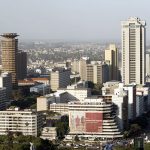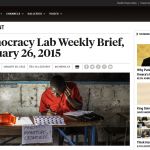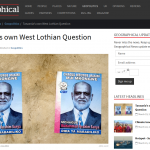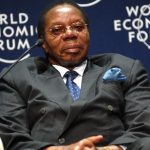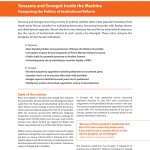On Sunday 25 October, Tanzanians will elect a new president and parliament in the country’s fifth multi-party elections. As highlighted in ARI Briefing Note, “What’s in it for me? Personalities, enticements and party loyalties in Tanzania’s 2015 elections”, individual politicians have received much greater attention than the manifestos they are supposed to be promoting to the electorate. In the absence of a discussion over needs and grievances, and the appropriate policies to address those, ARI Senior Researcher, Nick Branson, examines the manifestos of the ruling party Chama Cha Mapinduzi (CCM) and opposition Chama cha Demokrasia na Maendeleo (Chadema), which leads an alliance known as Ukawa, or Umoja wa Katiba ya Wananchi (Coalition of Defenders of the People’s Constitution).
According to its 50,000 word manifesto, a future CCM government would focus on four issues: tackling youth unemployment; alleviating rural poverty; combating corruption; and maintaining peace and stability. After 38 years in power (not to mention a further dozen in the guise of its predecessor parties), CCM believes it still has much to offer Tanzania.
- Continuity over change: Despite making use of the state machinery to produce a comprehensive manifesto, CCM presents few new ideas. Instead, a commitment to implement existing strategic plans: Development Vision 2025, initiated under President Mkapa; Kilimo Kwanza, President Kikwete’s flagship agricultural transformation programme; and Matokeo Makubwa Sasa, or “Big Results Now”, modelled on Malaysia’s development. Curiously, the final chapter of the document outlines the role of CCM’s local party structures in monitoring the implementation of the manifesto by government. A hangover from the party-state era?
- Amani na usalama: CCM owns the narrative on peace and stability, contrasting the tranquillity of Tanzania with its neighbours. The ruling party has more recently linked the peace and stability shibboleth with more sinister rhetoric around insecurity, including allegations that the opposition is seeking to destabilise the Union. A recent article by CCM secretary-general, Abdulrahman Kinana, attempted to associate (Lutheran) presidential candidate Edward Lowassa with Islamic fundamentalists. Masters of the politics of distraction, the ruling party is playing up the “risk” that regime change might pose to Tanzania’s stability rather than allowing space for debate about its record on economic growth, job creation and poverty alleviation.
- Rural heartland: The majority of CCM’s policies remain targeted at rural Tanzanians, who account for 70% of the population. For example, the document commits a future CCM government to establish Land and Housing Councils to resolve disputes. It also pledges to accelerate the allocation of title deeds, enabling landowners to use property as collateral to obtain credit for developing their land. The question is whether such ambitions are credible. Plans to provide 2 million citizens with land title documents within five years appear unrealistic when compared with the 348,000 issued over the same period to date.
- Magufuli’s fingerprints: CCM’s presidential candidate has evidently contributed to sections of the document. Magufuli’s promise to establish a special court to try those accused of abusing the public purse features prominently, as does a detailed list of infrastructure upgrades from his time as Minister of Works. The government has made considerable efforts to relieve congestion in Dar es Salaam, with plans to launch a Bus Rapid Transit (BRT) in October. Is it a coincidence that the first phase will serve constituencies in Kinondoni which returned Chadema MPs in 2010?
- Neglected domains: The document has little to boast about regarding natural resources. Gold mining has failed to meet (high) expectations. The country lags behind India in terms of Tanzanite exports, despite being the only country in the world where the stone is found. No mention is made of Tanzania’s global competitiveness when compared with its neighbours. Tourism receives some attention, but little is done to explain how the country intends to nearly double the number of overseas visitors in the space of five years. CCM also pledges to increase the number of Tanzanians with access to clean water, from 20 to 43 million, in the next five years – another audacious claim.
- The State of the Union: Zanzibar receives its own dedicated chapter, which runs for fully 70 pages/18,000 words, followed by a chapter dealing with issues of governance. On the katiba controversy, CCM’s manifesto uses the past and future tenses: the constitution has been agreed by the constituent assembly and it will be put to a popular referendum. There is no scope for negotiation or debate. The Union is to be safeguarded in its present form; a dual-government structure, rather than a fully-fledged federation. This position was reiterated by CCM ideology and publicity secretary, Nape Nnauye: “As far as we are concerned, the process has been finalised, so there is no need to make it a campaign issue…The process is over and what remains is only the referendum.”
Chadema’s manifesto deals with issues relating to the Union and mainland, while fellow Ukawa member the Civic United Front (CUF) deals with Zanzibar in a separate document. On the campaign trail, Chadema has focused on four priorities: strengthening Tanzania’s economy, the rule of law and human rights; improving social services; eradicating poverty; and helping Tanzanians to change their lives (whatever that may mean). Ukawa’s presidential candidate, Edward Lowassa, has promised to abandon ideas which have not worked and adopt those which do.
- Change everything: Chadema has long branded itself as “Movement for Change” (M4C). The party argues that CCM has failed Tanzania on four counts: denying Tanzanians a new constitution which reflects the interests of citizens and can provide accountable government; a lack of patriotism and integrity among the country’s leaders, leading to inefficient and irresponsible governance; “entrepreneurial politics”, allowing short-term personal interests to dictate the management of the economy, rather than long-term strategic plans and policy priorities; and the enduring monopoly of one party over the state apparatus.
- Lofty values: The opposition has no record in government, nor access to teams of civil servants to compile statistics and strategies. Instead, the document aims to inspire a following through the extensive use of value-infused and emotive words such as “patriotism”, “integrity”, “efficiency”, “productivity”, “responsibility”, and “discipline”, without ever defining those terms mean or detailing how they are to be achieved. How such highfalutin rhetoric sits with Chadema’s choice of presidential candidate is for voters to decide.
- The solution? A new constitution! Unsurprisingly, the issue which united the Ukawa members – Tanzania’s katiba – is listed as the number one priority. The manifesto commits Chadema to adopt a three-tier government structure: one for Zanzibar, a second for the mainland, and a third for the Union. Governance reforms are posited as the means to combat corruption.
- Free markets…: By adopting the tenets of economic liberalism, the party has positioned itself to appeal to a younger and more entrepreneurial generation of Tanzanians. The manifesto refers to an ideological commitment to prioritise the national interest over private or party preferences, a desire to strengthen the free market economy, and a wish engage citizens in private enterprise. As if a panacea, private schools, universities, hospitals and care homes are cited as the solution to Tanzania’s challenges on education and healthcare – without explanation of how investment in these sectors might be encouraged.
- …and a developmental state: A commitment to a “social market economy” is evidence of the close relationship which Chadema enjoys with the Konrad Adenauer Stiftung, a German political foundation named after the post-war chancellor and Christian Democratic Union (CDU) leader. Yet Chadema also pledges to provide tax relief to priority sectors (industry, agriculture and tourism), to pick winners and to support Tanzanian firms to win government contracts through altering procurement rules.
- The candidate vs. his (new) party: Further inconsistencies have emerged on the campaign trail. Lowassa has attempted to combine Chadema’s promise to woo business by strengthening the legislative and regulatory environment with more populist plans to combat tax evasion and review arbitrary tax exemptions. His commitment to ensure that parastatals are run on the basis of profitability and integrity – rather than providing jobs for the politically-connected – ignores political realities.
Inconsistencies and improbable promises may matter little. Few Tanzanians will read the manifestos. The candidates are mostly preoccupied with making small-scale promises to upgrade local infrastructure rather than weighty pledges to address issues which affect the nation as a whole. The media remains transfixed by the “big men”. As for the outcome on 25 October, that will be substantially determined by just how many Tanzanians are willing – or moved – to vote.








